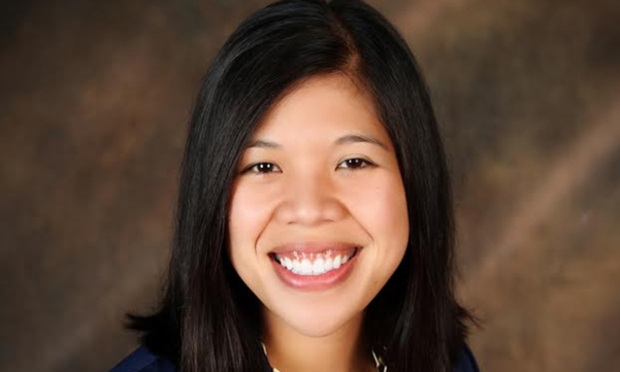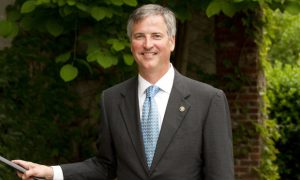JQC Cautioned Judge About Ethical Constraints Tied to Holding State Bar Post
Last year, the executive director of the state judicial watchdog agency issued informal guidelines to a South Georgia magistrate judge restricting some of her activities as president of the State Bar of Georgia's Young Lawyers Division that might violate the state Code of Judicial Conduct.
May 21, 2018 at 03:48 PM
5 minute read
 Rizza O'Connor.
Rizza O'Connor. While Georgia's Judicial Qualifications Commission never advised state Appeals Court candidate Ken Hodges on simultaneously serving as a judge and president of the State Bar of Georgia, the judicial watchdog agency did informally advise another judge with similar ambitions.
Hodges is running against former bar president Ken Shigley in the state appellate court's only contested race.
More than a year ago, Toombs County Chief Magistrate Judge Rizza O'Connor asked the JQC to advise her on the propriety of a full-time judge serving as president of the bar's Young Lawyers Division. O'Connor currently is the YLD's president-elect.
Membership in the Young Lawyers Division is automatic for Georgia attorneys who are younger than 36 or who have been admitted to the bar for the first time and been members less than five years. Its officers serve as members of the bar's executive committee.

O'Connor said Monday that she asked the JQC, which polices the ethical conduct of the state's judges, for an advisory opinion because no judge had ever served as an executive officer. Judges have served on the bar's governing board.
“I really wanted some guidance,” said O'Connor, who will become president next month.
The JQC declined to issue a formal advisory opinion in response to O'Connor's request, saying it was “a policy matter best addressed by the bar,” according to a June 12, 2017, email from JQC Director Ben Easterlin.
But Easterlin offered an informal opinion, which he said he was authorized to do.
O'Connor said she shared Easterlin's advice with the bar's executive committee, on which Hodges also sits.
“Ken and I have talked about it,” she said. Easterlin's correspondence, she explained, “clearly stated … what we can and what we can't do. It's very reasonable, and there are black-and-white rules to follow.”
“I do think it's something people should know,” she continued. “There really needed to be some guidelines.”
Hodges told the Daily Report he had “a frank and open discussion” with the executive committee. “It's not prohibited in any way by any rules or regulations” now in place, he said.
O'Connor said she immediately began adhering to the rules Easterlin laid out.
Easterlin advised that serving simultaneously as a judge and YLD president does not violate the state's judicial conduct code. But, he said, “While holding dual positions is not by itself a violation, ignoring the limitations placed on that circumstance would lead to or create a violation.”
“In your position as YLD president (and this applies to any State Bar or YLD officer/judge), you must diligently recognize and avoid situations that might cause your dual-office situation to violate the code,” Easterlin wrote.
Easterlin then provided the following list of restrictions:
- “You should not be personally involved in promoting or opposing legislation other than legislation addressing the administration of justice generally;
- You should not use your YLD position to advance your judicial career, and you should not use your judicial office to gain a benefit related to YLD office. Specifically, you should not engage in any judicial campaign efforts in conjunction with any YLD or State Bar events or activities, and vice versa;
- You should have no part in any amicus brief filed by the State Bar or the YLD or any litigation involving either;
- You should have no role in any YLD or State Bar fund-raising activity. Your name should not be on any letter, or even on the letterhead, soliciting funds. You should not speak at or sit in a position of prominence at any fundraising event;
- You should not serve on any bar admissions or disciplinary boards.”
Easterlin also cautioned that the code requires that judicial duties take precedence over all other activities.
“It would be a code violation to neglect your judicial duties while fulfilling the extensive and time-consuming duties of YLD president,” he said.
Easterlin also said the judicial code's prohibition against creating even the appearance of impropriety “should serve as a caution before taking any action, making any public appearance, or making any public statement in your position as YLD president.”
O'Connor said her adherence to Easterlin's directive has not impacted her job as chief magistrate.
“My work obviously comes first,” she said. “That's what the judicial rules say. … I'm just having to work longer hours in order to be able to keep up.”
But she added, “I am a small town magistrate. My powers are only within the county. Most of the people who come before me aren't lawyers. About 90 percent of the cases I see are people who are pro se. It really hasn't been an issue because my jurisdiction is so limited.”
This content has been archived. It is available through our partners, LexisNexis® and Bloomberg Law.
To view this content, please continue to their sites.
Not a Lexis Subscriber?
Subscribe Now
Not a Bloomberg Law Subscriber?
Subscribe Now
NOT FOR REPRINT
© 2025 ALM Global, LLC, All Rights Reserved. Request academic re-use from www.copyright.com. All other uses, submit a request to [email protected]. For more information visit Asset & Logo Licensing.
You Might Like
View All
Fowler White Burnett Opens Jacksonville Office Focused on Transportation Practice
3 minute read
Georgia High Court Clarifies Time Limit for Lawyers' Breach-of-Contract Claims
6 minute read
Southeast Firm Leaders Predict Stability, Growth in Second Trump Administration
4 minute read
Trending Stories
- 1'A Death Sentence for TikTok'?: Litigators and Experts Weigh Impact of Potential Ban on Creators and Data Privacy
- 2Bribery Case Against Former Lt. Gov. Brian Benjamin Is Dropped
- 3‘Extremely Disturbing’: AI Firms Face Class Action by ‘Taskers’ Exposed to Traumatic Content
- 4State Appeals Court Revives BraunHagey Lawsuit Alleging $4.2M Unlawful Wire to China
- 5Invoking Trump, AG Bonta Reminds Lawyers of Duties to Noncitizens in Plea Dealing
Who Got The Work
J. Brugh Lower of Gibbons has entered an appearance for industrial equipment supplier Devco Corporation in a pending trademark infringement lawsuit. The suit, accusing the defendant of selling knock-off Graco products, was filed Dec. 18 in New Jersey District Court by Rivkin Radler on behalf of Graco Inc. and Graco Minnesota. The case, assigned to U.S. District Judge Zahid N. Quraishi, is 3:24-cv-11294, Graco Inc. et al v. Devco Corporation.
Who Got The Work
Rebecca Maller-Stein and Kent A. Yalowitz of Arnold & Porter Kaye Scholer have entered their appearances for Hanaco Venture Capital and its executives, Lior Prosor and David Frankel, in a pending securities lawsuit. The action, filed on Dec. 24 in New York Southern District Court by Zell, Aron & Co. on behalf of Goldeneye Advisors, accuses the defendants of negligently and fraudulently managing the plaintiff's $1 million investment. The case, assigned to U.S. District Judge Vernon S. Broderick, is 1:24-cv-09918, Goldeneye Advisors, LLC v. Hanaco Venture Capital, Ltd. et al.
Who Got The Work
Attorneys from A&O Shearman has stepped in as defense counsel for Toronto-Dominion Bank and other defendants in a pending securities class action. The suit, filed Dec. 11 in New York Southern District Court by Bleichmar Fonti & Auld, accuses the defendants of concealing the bank's 'pervasive' deficiencies in regards to its compliance with the Bank Secrecy Act and the quality of its anti-money laundering controls. The case, assigned to U.S. District Judge Arun Subramanian, is 1:24-cv-09445, Gonzalez v. The Toronto-Dominion Bank et al.
Who Got The Work
Crown Castle International, a Pennsylvania company providing shared communications infrastructure, has turned to Luke D. Wolf of Gordon Rees Scully Mansukhani to fend off a pending breach-of-contract lawsuit. The court action, filed Nov. 25 in Michigan Eastern District Court by Hooper Hathaway PC on behalf of The Town Residences LLC, accuses Crown Castle of failing to transfer approximately $30,000 in utility payments from T-Mobile in breach of a roof-top lease and assignment agreement. The case, assigned to U.S. District Judge Susan K. Declercq, is 2:24-cv-13131, The Town Residences LLC v. T-Mobile US, Inc. et al.
Who Got The Work
Wilfred P. Coronato and Daniel M. Schwartz of McCarter & English have stepped in as defense counsel to Electrolux Home Products Inc. in a pending product liability lawsuit. The court action, filed Nov. 26 in New York Eastern District Court by Poulos Lopiccolo PC and Nagel Rice LLP on behalf of David Stern, alleges that the defendant's refrigerators’ drawers and shelving repeatedly break and fall apart within months after purchase. The case, assigned to U.S. District Judge Joan M. Azrack, is 2:24-cv-08204, Stern v. Electrolux Home Products, Inc.
Featured Firms
Law Offices of Gary Martin Hays & Associates, P.C.
(470) 294-1674
Law Offices of Mark E. Salomone
(857) 444-6468
Smith & Hassler
(713) 739-1250






